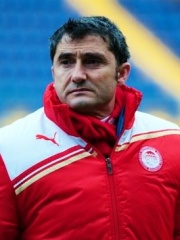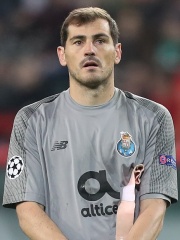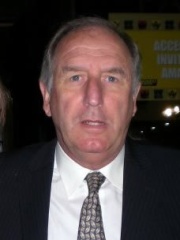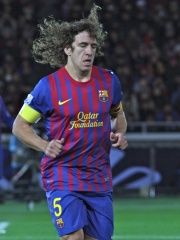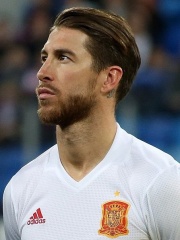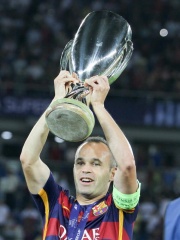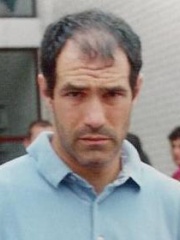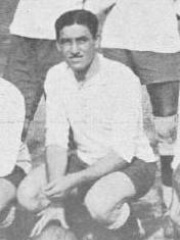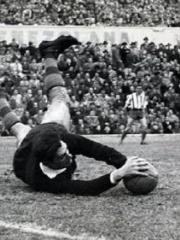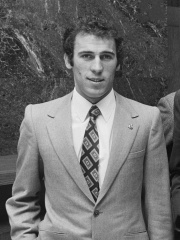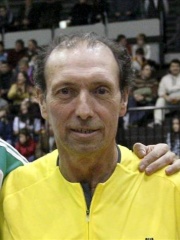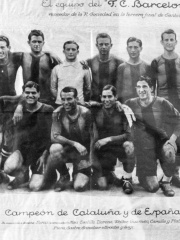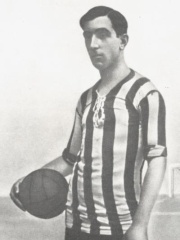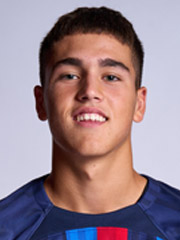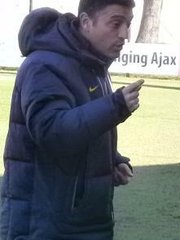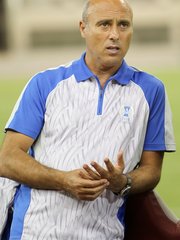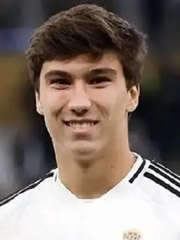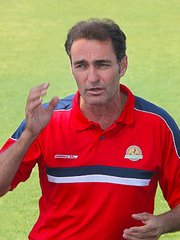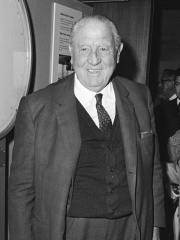
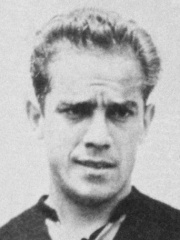
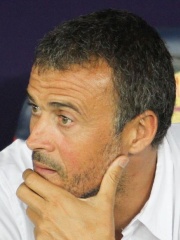
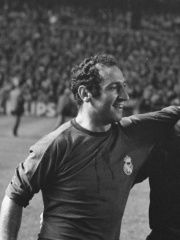
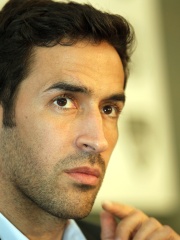
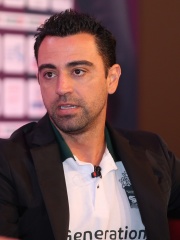
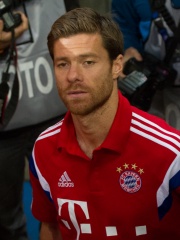
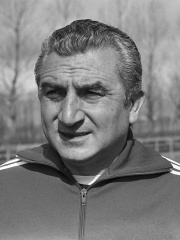
The Most Famous
SOCCER PLAYERS from Spain
This page contains a list of the greatest Spanish Soccer Players. The pantheon dataset contains 21,273 Soccer Players, 1,328 of which were born in Spain. This makes Spain the birth place of the 4th most number of Soccer Players behind Brazil, and United Kingdom.
Top 10
The following people are considered by Pantheon to be the top 10 most legendary Spanish Soccer Players of all time. This list of famous Spanish Soccer Players is sorted by HPI (Historical Popularity Index), a metric that aggregates information on a biography's online popularity. Visit the rankings page to view the entire list of Spanish Soccer Players.

1. Santiago Bernabéu Yeste (1895 - 1978)
With an HPI of 79.08, Santiago Bernabéu Yeste is the most famous Spanish Soccer Player. His biography has been translated into 49 different languages on wikipedia.
Santiago Bernabéu de Yeste (Spanish pronunciation: [sanˈtjaɣo βeɾnaˈβew ˈʝeste]; 8 June 1895 – 2 June 1978) was a Spanish footballer who played for Real Madrid as a forward. He is widely regarded as one of the most important figures in the history of Real Madrid, having served as its president for 34 years and 264 days, from 11 September 1943 until his death on 2 June 1978. Under Bernabéu's leadership, Real Madrid became a dominant team both on national and international level, with its influence stretching beyond the football pitch. The club's current stadium is named in his honour.

2. Luis Suárez (1935 - 2023)
With an HPI of 76.79, Luis Suárez is the 2nd most famous Spanish Soccer Player. His biography has been translated into 46 different languages.
Luis Suárez Miramontes (Spanish pronunciation: [ˈlwis ˈswaɾeθ miɾaˈmontes]; 2 May 1935 – 9 July 2023) was a Spanish professional footballer and manager. He played as a midfielder for Deportivo de La Coruña, España Industrial, Barcelona, Inter Milan, Sampdoria; he also represented the Spain national team between 1957 and 1972. Widely regarded as one of the greatest Spanish football players of all time, Suárez was noted for his elegant and fluid style of play and also regarded to be one of the greatest midfielders in the history of the sport. Nicknamed El Arquitecto – The Architect – or Luisito, in 1960 Suárez became the first Spanish-born player to win the Ballon d'Or. In 1964, he helped Spain win their first European Championship title. Suárez originally achieved prominence as a creative inside forward, or attacking midfielder in modern terms, during his spell at Barcelona in the 1950s, before reaching his prime as a deep-lying playmaker at Inter Milan, where he played a pivotal role in the success of Helenio Herrera's side, and was one of the primary creative forces in the squad, thanks to his skill on the ball, vision, and passing range. He retired as a player in 1973, after three seasons at Sampdoria. Suárez subsequently began a career as a coach and managed Inter Milan on three separate occasions, the latter two of which on a caretaker basis. He was also at the helm of both the Spain under-21 national team, which he led to a European Under-21 Championship title in 1986, and the Spanish senior national team, which he led to the round of 16 of the 1990 World Cup. He died in Milan on 9 July 2023, aged 88.

3. Luis Enrique (b. 1970)
With an HPI of 76.04, Luis Enrique is the 3rd most famous Spanish Soccer Player. His biography has been translated into 61 different languages.
Luis Enrique Martínez García (Spanish pronunciation: [lwis enˈrike maɾˈtineθ ɡaɾˈθia]; born 8 May 1970), known as Luis Enrique, is a Spanish football manager and former player. He is currently the head coach of Ligue 1 club Paris Saint-Germain. A versatile player with good technique, he was capable of playing in several positions, but usually played as a midfielder or forward, and was also noted for his temperament and stamina. Starting in 1991 and ending in 2004, he represented both Real Madrid and Barcelona with both individual and team success, appearing in more than 500 official games and scoring more than 100 goals. He appeared with the Spain national team in three World Cups and one European Championship. Luis Enrique started working as a manager in 2008 with Barcelona B, before moving to Roma three years later. In the 2013–14 season he managed Celta, before returning to Barcelona and winning the treble in his first year and the double in the second. In 2018, he was appointed Spain head coach for the first time before resigning for family reasons in 2019; he reassumed the position the same year and subsequently led the team to the semi-finals of Euro 2020 and the second place in the 2020–21 Nations League, resigning at the end of the 2022 World Cup. In July 2023, he joined French club Paris Saint-Germain, claiming three trophies in his first season and four in his second including the first Champions League in their history.

4. Francisco Gento (1933 - 2022)
With an HPI of 75.90, Francisco Gento is the 4th most famous Spanish Soccer Player. His biography has been translated into 50 different languages.
Francisco "Paco" Gento López (21 October 1933 – 18 January 2022) was a Spanish footballer who played as an outside left. A fast runner, Gento was referred to as the "Gale of the Cantabrian Sea" (Spanish: La Galerna del Cantábrico) in reference to his speed down the wing. He was voted by IFFHS (International Federation of Football History and Statistics) as the greatest Spanish footballer and 30th greatest world footballer of the 20th century. Gento is also widely regarded as one of the greatest wingers in the history of the sport. Gento began his career at Racing Santander in 1952 and moved to Real Madrid the following season. He appeared in a joint record eight European Cup finals, winning a joint record six, as well as winning a record 12 La Liga titles. In a 14-year international career, Gento earned 43 caps for Spain, playing at the World Cup in 1962 and 1966. Following the death of Alfredo Di Stéfano in 2014, Gento was appointed the Honorary President of Real Madrid.
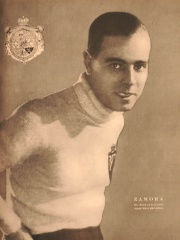
5. Ricardo Zamora (1901 - 1978)
With an HPI of 73.15, Ricardo Zamora is the 5th most famous Spanish Soccer Player. His biography has been translated into 41 different languages.
Ricardo Zamora Martínez (Spanish pronunciation: [riˈkaɾðo θaˈmoɾa maɾˈtineθ]; 21 January 1901 – 8 September 1978) was a Spanish football player and manager. He played as a goalkeeper for, among others, RCD Espanyol, FC Barcelona and Real Madrid. As an international he played for Spain. As a manager, he won two La Liga titles with Atlético Madrid (then Atlético Aviación) and briefly managed Spain.

6. Raúl (b. 1977)
With an HPI of 71.20, Raúl is the 6th most famous Spanish Soccer Player. His biography has been translated into 77 different languages.
Raúl González Blanco (Spanish pronunciation: [raˈul ɣonˈθaleθ ˈβlaŋko]; born 27 June 1977), known mononymously as Raúl, is a Spanish football manager and former player who played as a forward. He most recently managed Real Madrid Castilla, the reserve team of La Liga club Real Madrid. Regarded as one of the greatest strikers of all time, Raúl made over 1,000 appearances in his career and stands as the all-time Spanish top goalscorer in the Champions League with 71 goals. Raúl spent 16 years of his career playing for Real Madrid, becoming the holder for most appearances with the club (741). With Los Blancos, he won six La Liga titles, three Champions Leagues, four Supercopa de España titles, one UEFA Super Cup, and two Intercontinental Cups. In 2001, he was runner-up in the Ballon d'Or, and two years later became captain of Real Madrid. Raúl left the club in 2010 with 323 goals scored for them, signing for Bundesliga side Schalke 04. He won a DFB-Pokal and DFL-Supercup in Germany before moving to Qatari club Al Sadd and then American club New York Cosmos. For Spain, Raúl scored 44 goals in 102 appearances and is regarded as one of his nation's greatest ever players. He represented La Roja in three FIFA World Cups and two UEFA European Championships, being named in the Euro Team of the Tournament for 2000. He became the captain of the national team in 2002 and retired from international football in 2006. One of the most successful players in Champions League history, Raúl was named the UEFA Club Forward of the Year three years in a row (1999–2000, 2000–01 and 2001–02) and was the top goalscorer in the competition in 1999–2000 and 2000–2001. He was named the top international goalscorer in the world by International Federation of Football History & Statistics in 1999. Further awards include two Pichichi trophies, five Don Balón Awards, and the Best Player award at the 1998 Intercontinental Cup. In 2004, he was named in the FIFA 100 list of the world's greatest living players and was named in UEFA’s list of the 50 best European players of the 1954–2004 period. He was named in the European Team of the Year by European Sports Media in 1997, 1999, and 2000.

7. Xavi (b. 1980)
With an HPI of 71.08, Xavi is the 7th most famous Spanish Soccer Player. His biography has been translated into 87 different languages.
Xavier Hernández Creus (born 25 January 1980), commonly known as Xavi Hernández (Spanish: [ˈʃaβj eɾˈnandeθ]) or simply Xavi, is a Spanish professional football manager and former player who most recently managed La Liga club Barcelona. Widely regarded as one of the greatest midfielders of all time, Xavi was renowned for his exceptional passing and vision. He is the all-time Spanish top assist provider in the UEFA Champions League with 30 assists. He spent most of his playing career at Barcelona and is one of the few players to make over 1,000 professional career appearances. Xavi joined La Masia, the Barcelona youth academy, at age 11 and made his first-team debut against Mallorca in August 1998, age 18. For Barcelona, he played 767 official matches, a former club record—now held by Lionel Messi—and scored 85 goals. With the initial management guidance by Pep Guardiola and using the tiki-taka football philosophy, Xavi was part of a widely lauded midfield combination trio with Andrés Iniesta and Sergio Busquets; from 2008 to 2015 the trio together were instrumental in Barcelona's exceptional on-field successes in 7 seasons, winning five La Liga titles, three Copa del Rey titles and three Champions League titles, including two continental trebles (all three titles simultaneously) in 2008–09 and 2014–15. Xavi was the first player in the club's history to play 150 European and FIFA Club World Cup matches combined. In 2015, he left Barcelona for Al Sadd, where he won four trophies before retiring in 2019. With Spain, Xavi won the FIFA World Youth Championship in 1999, and the Olympic silver medal at the 2000 Olympics. He made his senior team debut in 2000 and he was capped 133 times for Spain. Xavi played an integral role in Spain's 2010 FIFA World Cup win, as well as their UEFA Euro 2008 and UEFA Euro 2012 victories. He was named Player of the Tournament at UEFA Euro 2008 and was named in the UEFA Euro Team of the Tournament in 2008 and 2012. With two assists in the UEFA Euro 2012 Final, Xavi became the first player to make assists in two separate European finals. After the 2014 FIFA World Cup, Xavi announced his retirement from international football. Xavi came third place in both the 2009 FIFA World Player of the Year and FIFA Ballon d'Or, followed by third place in the Ballon d'Or in 2010 and 2011. In 2011, he was runner up to Messi for the UEFA Best Player in Europe Award. Xavi was awarded the Prince of Asturias Award in 2012. He was awarded the IFFHS World's Best Playmaker award four consecutive times from 2008 to 2011. He was named in the FIFA FIFPro World XI six times from 2008 to 2013, and in the UEFA Team of the Year five times from 2008 to 2012. In 2020, Xavi was named in the Ballon d'Or Dream Team, a greatest all-time XI published by France Football. After retirement, Xavi transitioned to management. In May 2019, he became manager of Qatar Stars League club Al Sadd, where he won seven trophies in less than three years. In November 2021, Xavi was appointed as manager at his former club Barcelona. He won the 2023 Supercopa de España title and the 2022–23 La Liga title in his first full season as the club's manager.

8. Xabi Alonso (b. 1981)
With an HPI of 71.03, Xabi Alonso is the 8th most famous Spanish Soccer Player. His biography has been translated into 80 different languages.
Xabier Alonso Olano (Basque: [ˈʃaβi aˈlons̺o oˈlano], Spanish: [ˈʃaβj aˈlonso oˈlano]; born 25 November 1981) is a Spanish professional football manager and former player who is the head coach of La Liga club Real Madrid. Widely regarded as one of the greatest midfielders of his generation, he was known for his exceptional passing range and long-distance shooting. Alonso is also currently considered to be one of the best young managers in the world. Alonso began his career at Real Sociedad, the main team of his home province Gipuzkoa. After a brief loan period at Eibar, he was appointed as team captain of Real Sociedad and finished runner-up in La Liga in 2002–03 season. He moved to Liverpool in 2004 for £10.5 million and won the UEFA Champions League in his first season, scoring in the final. He later won the UEFA Super Cup, the FA Cup and the FA Community Shield. Alonso moved to Real Madrid in 2009 in a deal worth £30 million and won La Liga, two Copa del Rey titles, and another UEFA Champions League. He joined German club Bayern Munich in 2014 and won three Bundesliga titles, including a domestic double in his second season, and retired in 2017. He made his international debut for Spain in April 2003 and went on to win the European Championship twice in 2008 and 2012, as well as the 2010 World Cup. He also represented Spain at Euro 2004 and the 2006 World Cup. On 23 June 2012, Alonso won his 100th cap for Spain in the quarter-final of Euro 2012 against France, where he scored both goals in a 2-0 victory. Alonso retired from international football after the 2014 World Cup. His 114 appearances make him the eighth-most capped player in Spain's history. Alonso coached Real Madrid's U14 team before being appointed as manager of Real Sociedad B in 2019, where he won promotion to the Segunda División in his second season. Alonso was named head coach of Bayer Leverkusen in 2022 and completed an unprecedented unbeaten domestic double in 2024, winning the club's first ever Bundesliga title and first DFB-Pokal since 1993. After two-and-a-half years with the German side, Alonso was appointed as the new head coach of his former club Real Madrid in June 2025.

9. Miguel Muñoz (1922 - 1990)
With an HPI of 70.36, Miguel Muñoz is the 9th most famous Spanish Soccer Player. His biography has been translated into 36 different languages.
Miguel Muñoz Mozún (19 January 1922 – 16 July 1990) was a Spanish football player and manager. A midfielder, he spent the majority of his career at Real Madrid before going on to coach the club, where he is widely considered one of the most successful and greatest managers in football history, leading the team to two European Cup victories and nine La Liga titles (winning seven major titles in both major competitions combined as a player). Muñoz later had a six-year coaching spell with the Spain national team, and led them to the final of Euro 1984.
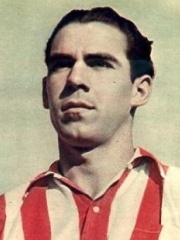
10. Telmo Zarra (1921 - 2006)
With an HPI of 69.01, Telmo Zarra is the 10th most famous Spanish Soccer Player. His biography has been translated into 37 different languages.
Pedro Telmo Zarraonandía Montoya (20 January 1921 – 23 February 2006), known as Telmo Zarra (Basque: [ˈs̻ara], Spanish: [ˈθara]), was a Spanish football forward. He spent the majority of his career at Athletic Bilbao, from 1940 to 1955, for whom he remains the top scorer in competitive matches with 335 goals. Zarra signed for Athletic after playing one season for Erandio. He became a prolific goalscorer in his 15 seasons at the club, winning the Pichichi Trophy as the highest scorer in La Liga on six occasions. During his career, Zarra scored a total of 251 league goals, a Spanish record that lasted nearly six decades before being broken by Lionel Messi. His 81 goals in the Copa del Rey remain a record. Despite his goalscoring records, he only played for Spain 20 times. Even so, he still managed to score 20 goals, including four in one match as Spain beat Switzerland 6–3 on 18 February 1951. He also scored his country's winning goal against England in the 1950 World Cup finals as Spain reached the final four—their best performance in the competition until winning the 2010 FIFA World Cup 60 years later. After leaving Athletic in 1955, he played for one year with SD Indautxu and another with Barakaldo CF before retiring. He died of a heart attack on 23 February 2006, aged 85. The Zarra Trophy for the highest-scoring Spaniard in La Liga is awarded in his memory.
People
Pantheon has 1,328 people classified as Spanish soccer players born between 1878 and 2007. Of these 1,328, 1,168 (87.95%) of them are still alive today. The most famous living Spanish soccer players include Luis Enrique, Raúl, and Xavi. The most famous deceased Spanish soccer players include Santiago Bernabéu Yeste, Luis Suárez, and Francisco Gento. As of April 2024, 174 new Spanish soccer players have been added to Pantheon including Raúl Asencio, Pau Cubarsí, and Monchi.
Living Spanish Soccer Players
Go to all RankingsLuis Enrique
1970 - Present
HPI: 76.04
Raúl
1977 - Present
HPI: 71.20
Xavi
1980 - Present
HPI: 71.08
Xabi Alonso
1981 - Present
HPI: 71.03
Ernesto Valverde
1964 - Present
HPI: 68.61
Iker Casillas
1981 - Present
HPI: 68.53
Carles Rexach
1947 - Present
HPI: 68.52
Carles Puyol
1978 - Present
HPI: 68.31
Sergio Ramos
1986 - Present
HPI: 68.28
Andrés Iniesta
1984 - Present
HPI: 67.92
Emilio Butragueño
1963 - Present
HPI: 67.76
Andoni Zubizarreta
1961 - Present
HPI: 67.65
Deceased Spanish Soccer Players
Go to all RankingsSantiago Bernabéu Yeste
1895 - 1978
HPI: 79.08
Luis Suárez
1935 - 2023
HPI: 76.79
Francisco Gento
1933 - 2022
HPI: 75.90
Ricardo Zamora
1901 - 1978
HPI: 73.15
Miguel Muñoz
1922 - 1990
HPI: 70.36
Telmo Zarra
1921 - 2006
HPI: 69.01
Pedro Cea
1900 - 1970
HPI: 68.37
Antoni Ramallets
1924 - 2013
HPI: 66.88
Amancio Amaro
1939 - 2023
HPI: 66.70
Quini
1949 - 2018
HPI: 66.34
Josep Samitier
1902 - 1972
HPI: 66.32
Rafael Moreno Aranzadi
1892 - 1922
HPI: 66.13
Newly Added Spanish Soccer Players (2025)
Go to all RankingsRaúl Asencio
2003 - Present
HPI: 51.62
Pau Cubarsí
2007 - Present
HPI: 51.41
Monchi
1968 - Present
HPI: 49.82
García Pimienta
1974 - Present
HPI: 48.32
Tintín Márquez
1962 - Present
HPI: 48.23
Joan García
2001 - Present
HPI: 47.90
Gonzalo García
2004 - Present
HPI: 47.88
Marc Casadó
2003 - Present
HPI: 47.61
Urbano Ortega
1961 - Present
HPI: 47.00
Cristóbal Parralo
1967 - Present
HPI: 46.55
Adolfo Aldana
1966 - Present
HPI: 46.50
Esther González
1992 - Present
HPI: 46.35
Overlapping Lives
Which Soccer Players were alive at the same time? This visualization shows the lifespans of the 25 most globally memorable Soccer Players since 1700.

